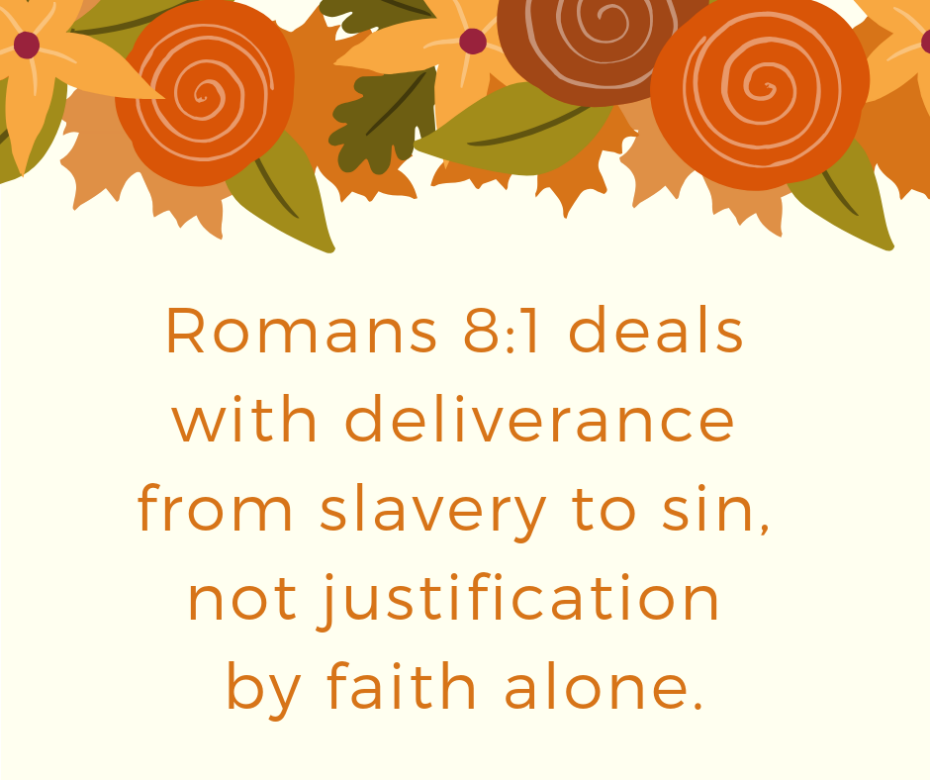Romans 8:1 is widely misunderstood for two reasons: first, katakrima, the word typically translated as condemnation, does not mean that. That will be the subject of this blog. Second, the people being described as having no katakrima are not all who believe in Christ for everlasting life, but a particular type of believer. That will be the subject of Part 2.
The typical way of understanding katakrima in Rom 8:1 is that it refers to eternal condemnation. Thus, the point of the verse is thought to be that there is no eternal condemnation for those who are in Christ Jesus. Essentially this is seen as a restatement of Rom 3:26 (“He [is] the justifier of the one who has faith in Jesus”) and Rom 3:28 (“a man is justified by faith apart from the deeds of the law”).
C. E. B. Cranfield says, “For those who are in Christ Jesus (cf. 6:2-11; 7:4) there is no divine condemnation, since the condemnation which they deserve has already been fully borne for them by Him” (Romans, ICC, Vol. 1, p. 373).
Similarly, John MacArthur writes,
…[the] primary focus [of katakrima] is not so much on the verdict as on the penalty that the verdict demands…Paul here announces the marvelous good news that for Christians there will be no condemnation, neither sentencing nor punishment for the sins that believers have committed or will ever commit (Romans, Vol. 1, p. 399, emphasis his).
Of course, justification by faith alone is indeed marvelous good news. But that is not what Paul is talking about here.
Many forget that Rom 8:1 is part of the sanctification section of the book. Romans 8 answers Paul’s poignant question from the end of Romans 7, “O wretched man that I am! Who will deliver me from this body of death?” (Rom 7:24). In Rom 7:13-25, Paul describes what spiritual defeat for a believer is like. Then in Rom 8:1-13, Paul is describing how a believer can experience spiritual victory.
The word which is typically here translated as condemnation is not one of the normal words for condemnation, krinō and krima. It is a different word, katakrima, used only three times in the entire NT, all in Romans (5:16, 18; 8:1).
In his commentary on Romans, famed British commentator F. F. Bruce says,
The word katakrima here means ‘probably not “condemnation,” but the punishment following sentence’ (BAGD, p. 413)—in other words, [katakrima here means] penal servitude. There is no reason for those who are ‘in Christ Jesus’ to go on doing penal servitude as though they had…never been released from the prison-house of sin (Romans, p. 151).
Similarly, John Murray says in his Romans commentary that, “In this context…the apostle is not dealing with justification…but with sanctification and with what God has done in Christ to deliver us from the power of sin” (Romans, p. 275).
I hate to take away what is the favorite justification verse in the entire Bible for many Christians. But Rom 8:1 is about sanctification, not about justification.
Paul is saying that a certain type of believer will not experience slavery to sin. In Part 2 we will look at the second half of Rom 8:1 and see what type of believer Paul is talking about.


